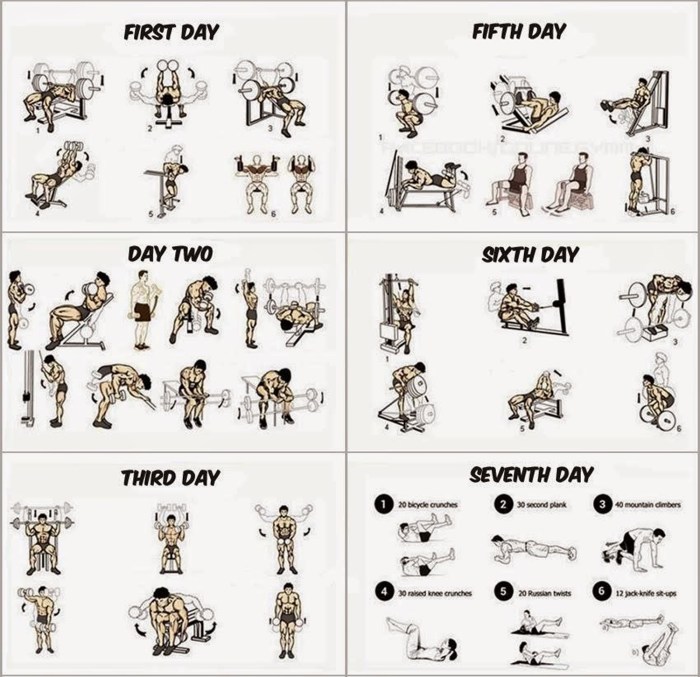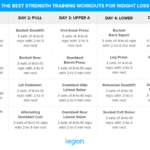Best Workout To Build Strength: Unlocking peak physical potential requires a strategic approach to training. This isn’t just about lifting heavier weights; it’s about understanding the nuances of strength development—muscular strength, power, and endurance—and tailoring your regimen to your specific goals. Genetics play a role, but consistent effort, proper form, and a smart nutritional plan are crucial for maximizing results.
This guide delves into the science and practice of building significant strength, providing actionable strategies for beginners and experienced lifters alike.
We’ll explore fundamental exercises, optimal workout program design, the importance of progressive overload and periodization, and the role of nutrition and recovery. We’ll also address common pitfalls and offer solutions to help you avoid injury and maintain motivation. Whether you’re aiming for a leaner physique, improved athletic performance, or simply increased functional strength in daily life, this comprehensive guide will empower you to achieve your fitness goals.
Nutrition and Recovery for Strength Building: Best Workout To Build Strength

Optimizing nutrition and recovery is crucial for maximizing strength gains. A well-structured nutritional plan, coupled with adequate rest and stress management, significantly impacts muscle growth, repair, and overall performance. Ignoring these aspects can hinder progress, leading to plateaus and potentially injury.
Macronutrient Requirements for Muscle Growth, Best Workout To Build Strength
Building muscle requires a consistent surplus of calories, primarily derived from macronutrients: protein, carbohydrates, and fats. Protein is the cornerstone of muscle protein synthesis, the process responsible for muscle growth and repair. Carbohydrates provide the energy needed for intense workouts and replenish glycogen stores, crucial for optimal performance and recovery. Fats are essential for hormone production and overall bodily functions.
The optimal ratio of these macronutrients varies depending on individual factors such as activity level, body composition, and metabolic rate, but a general guideline is often suggested.
Importance of Sleep and Stress Management
Adequate sleep is paramount for muscle recovery and growth. During sleep, the body releases growth hormone, a key player in muscle repair and protein synthesis. Insufficient sleep disrupts this process, hindering muscle growth and increasing the risk of overtraining. Stress, whether physical or mental, elevates cortisol levels, a catabolic hormone that can break down muscle tissue. Effective stress management techniques, such as meditation, yoga, or spending time in nature, are crucial for optimizing recovery and promoting muscle growth.
Sample Meal Plan for Strength Building
The following sample meal plan provides a general guideline for a person aiming to build strength. Individual needs may vary, and adjustments should be made based on personal factors and caloric requirements. Consulting a registered dietitian or sports nutritionist is recommended for personalized guidance.
- Breakfast (approx. 500 calories): 3 whole eggs scrambled with spinach and mushrooms, 1 slice whole-wheat toast with avocado, 1 cup of berries.
- Lunch (approx. 600 calories): 6 ounces grilled chicken breast, 1 cup brown rice, 1 cup steamed broccoli, a small serving of olive oil and vinegar dressing.
- Dinner (approx. 700 calories): 6 ounces lean ground beef stir-fry with mixed vegetables (broccoli, peppers, onions) and quinoa. A small portion of a healthy fat source like nuts or seeds can be included.
- Snacks (approx. 200-300 calories total): Greek yogurt with fruit, a protein shake, a handful of almonds, or a piece of fruit with peanut butter. These snacks are strategically placed to support muscle recovery and prevent catabolism between meals.
Building significant strength is a journey, not a sprint. Consistent effort, coupled with a well-structured program that incorporates progressive overload, periodization, and proper nutrition, is key. By understanding the different types of strength, mastering fundamental exercises, and prioritizing recovery, you can safely and effectively build the strength you desire. Remember, consistency is paramount; even small, incremental gains over time will compound into substantial progress.
Embrace the challenge, and enjoy the journey to a stronger, healthier you.

